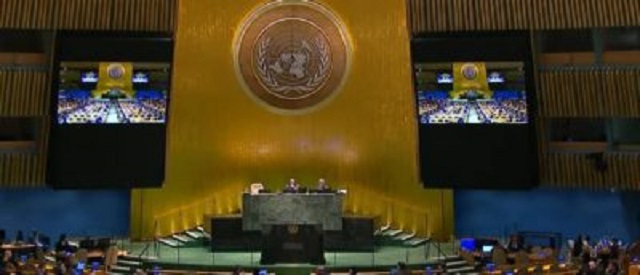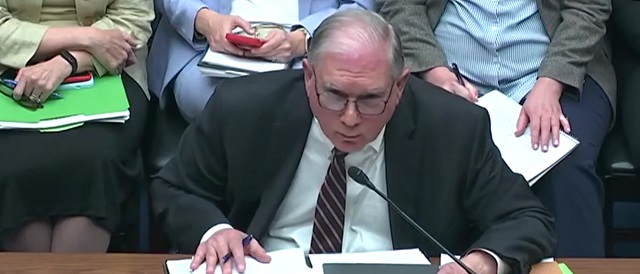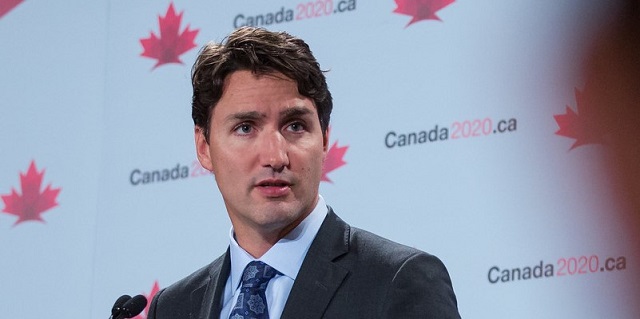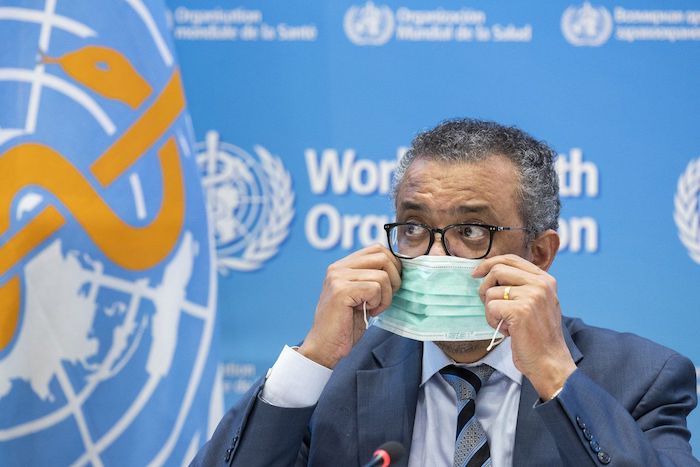Environment
The United Nations Couldn’t Be More Wrong When It Comes To Climate Change

 From the Daily Caller News Foundation
From the Daily Caller News Foundation
By JASON ISAAC
They still haven’t learned their lesson.
For decades, politicians and climate activists have been setting deadlines for humanity, brazenly preaching that we have just a few years left to stave off our fiery doom. In fact, we were supposed to have passed the deadline for taking dramatic action to save the world in 2000, 2012, 2016 2020, and 2023.
The United Nations is now ramping up their rhetoric again, with climate executive secretary Simon Stiell boldly (and, apparently, not rhetorically) asking: “Who exactly has two years to save the world? The answer is every person on this planet.”
As usual, the U.N. couldn’t be more wrong when it comes to climate change. In fact, the science to which it demands blind loyalty shows there has never been a better time in human history to be alive.
One Obama energy advisor described our culture’s understanding of climate change as having “drifted so far out of touch with the actual science as to be absurdly, demonstrably false.” He was not wrong. While celebrities, activists, politicians, and left-leaning CEOs are crying that the sky is falling, data shows that “[c]limate-related disasters kill 99% fewer people” than they did a century ago. Even though the world’s population has quadrupled over the same time period, the risk presented by mild warming has grown smaller and smaller.
Interestingly, our resilience to climate-related disasters is improving at a far faster rate than deaths from other natural disasters like volcanic eruptions and earthquakes. Clearly, the weather isn’t the culprit here.
In fact, even if the U.N. and its climate cartel were right, there is remarkably little we could do anyway. The data models their scientists use to project future warming show that even cutting every drop of oil and every grain of coal from our society would change global temperatures by at most a few hundredths of a degree. Those models, by the way, have overshot warming every time, making them a highly suspect justification for spending trillions to force our society to make dramatic changes for climate change.
In fact, new studies cataloging 420,000 years of historical geological and weather data suggest that manmade greenhouse gas emissions are not strong enough to affect global temperatures.
So many of us, in our comfortably air-conditioned and Wi-Fi-enabled lives — far removed from the blue-collar energy producers toiling every day to power our society — have forgotten just how essential fossil fuels are to our existence. Our agriculture, manufacturing, healthcare, transportation, public safety, utilities, banking, construction, entertainment and more would collapse without constant access to affordable, reliable energy.
Fossil fuels are the reason that the percentage of people living in extreme poverty has plummeted all over the world. In the pre-Industrial Revolution era, most of the world’s population lived in extreme poverty; 50 years ago it was about half the world population; today, it is less than 10%. Infant mortality, malnutrition and infectious diseases have plummeted while GDP, education, gender equality, economic freedom and life expectancy have skyrocketed.
The average child born today in any part of the world has a better chance at a long, healthy, and fruitful life than ever before — thanks, in part, to the life-saving and life-improving benefits of abundant energy.
We need only look to the pockets of the world still suffering from energy poverty to understand just how fortunate we are to live in 2024 instead of 1724. In communities without electricity — which nearly a billion people still don’t have and billions more have only sporadic access to — life expectancies still hover in the 50s and mere survival requires physical toil unimaginable to the average American.
Women walk for hours to collect unsanitary water and firewood or dung to burn in close quarters, exposing themselves to sexual assault and their whole families to deadly water-borne and lung disease. Children are fortunate to reach adulthood at all, let alone receive an education. Economic opportunity is close to nonexistent, even for men, outside subsistence farming.
Instead of protesting the fossil fuels that power our comfortable lives and spending trillions to possibly produce minute temperature change centuries from now, perhaps our world leaders should focus on solving the real problems facing real men, women, and children today. One of the easiest ways to do so is sharing the access to affordable, reliable energy we take for granted in the West.
I’ll keep embracing my high carbon lifestyle and hope that others get to do the same. See you in two years.
The Honorable Jason Isaac is CEO of the American Energy Institute and a senior fellow at the Texas Public Policy Foundation. He previously served four terms in the Texas House of Representatives.
The views and opinions expressed in this commentary are those of the author and do not reflect the official position of the Daily Caller News Foundation.
Economy
Feds spend $3 million to fly 182 politicians and bureaucrats to climate conference

From the Canadian Taxpayers Federation
Author: Ryan Thorpe
Feds trip to COP28 in Dubai cost $3 million
The cost for Canada to send hundreds of people to COP28 in Dubai has doubled, rising to nearly $3 million, according to government records obtained by the Canadian Taxpayers Federation.
Included in those costs is $1.3 million the federal government dished out to host a “Canada Pavilion” at the summit, which featured a rapper performing a song on “climate disinformation,” while giving a shoutout to Environment Minister Steven Guilbeault.
“Nothing screams fighting climate change like flying around the world burning through jet fuel and millions of tax dollars,” said Franco Terrazzano, CTF Federal Director. “Here’s a crazy idea: maybe the feds don’t need to spend $3 million flying 182 politicians and bureaucrats to Dubai.”
The federal government paid for at least 182 people to go to COP28, held from Nov. 30 to Dec. 12, 2023, in Dubai, United Arab Emirates.
A previous report from the National Post pegged the cost for Canada’s delegation at $1.4 million.
But the bill now sits at $2,954,188, including $825,466 for transportation, $472,570 for accommodations and $295,455 for meals and incidentals, according to the records.
The records indicate the cost could rise even higher, as certain invoices and travel claims “have yet to be processed.”
Costs included $1.3 million for a “Canada Pavilion” to “showcase the breadth of Canadian climate leadership.”
At the Canada Pavilion, a Canadian rapper known as Baba Brinkman – the son of Liberal MP Joyce Murray – performed a rap on “climate disinformation.”
“Climate disinformation, get that immunization, the vaccine for bad meme infiltration,” Brinkman rapped. “Climate misinformation, it leads to polarization, which leads to radical conspiracy ideation.”
Environment Minister Steven Guilbeault also received a shoutout during Brinkman’s rap.
“Really? Hosting a rapper half-way around the world to drop rhymes at a government podium will help the environment?” Terrazzano said.
The records were released in response to an order paper question from Conservative MP Dan Mazier (Dauphin-Swan River-Neepawa).
Most of the hotel expenses came from the Dubai Marriott and the Premier Inn at the Dubai Investment Park, with rooms coming in between $150 and $400 per night.
The most expensive digs was a $816-per-night suite at the Pullman Dubai Jumeriah Lakes Towers, a “five-star hotel offering upscale accommodations.”
The Canadian delegation also handed out $650 worth of gifts during the trip.
Business
Ottawa should end war on plastics for sake of the environment

From the Fraser Institute
Here’s the shocker: Meng shows that for 15 out of the 16 uses, plastic products incur fewer GHG emissions than their alternatives…
For example, when you swap plastic grocery bags for paper, you get 80 per cent higher GHG emissions. Substituting plastic furniture for wood—50 per cent higher GHG emissions. Substitute plastic-based carpeting with wool—80 per cent higher GHG emissions.
It’s been known for years that efforts to ban plastic products—and encourage people to use alternatives such as paper, metal or glass—can backfire. By banning plastic waste and plastic products, governments lead consumers to switch to substitutes, but those substitutes, mainly bulkier and heavier paper-based products, mean more waste to manage.
Now a new study by Fanran Meng of the University of Sheffield drives the point home—plastic substitutes are not inherently better for the environment. Meng uses comprehensive life-cycle analysis to understand how plastic substitutes increase or decrease greenhouse gas (GHG) emissions by assessing the GHG emissions of 16 uses of plastics in five major plastic-using sectors: packaging, building and construction, automotive, textiles and consumer durables. These plastics, according to Meng, account for about 90 per cent of global plastic volume.
Here’s the shocker: Meng shows that for 15 out of the 16 uses, plastic products incur fewer GHG emissions than their alternatives. Read that again. When considering 90 per cent of global plastic use, alternatives to plastic lead to greater GHG emissions than the plastic products they displace. For example, when you swap plastic grocery bags for paper, you get 80 per cent higher GHG emissions. Substituting plastic furniture for wood—50 per cent higher GHG emissions. Substitute plastic-based carpeting with wool—80 per cent higher GHG emissions.
A few substitutions were GHG neutral, such as swapping plastic drinking cups and milk containers with paper alternatives. But overall, in the 13 uses where a plastic product has lower emissions than its non-plastic alternatives, the GHG emission impact is between 10 per cent and 90 per cent lower than the next-best alternatives.
Meng concludes that “Across most applications, simply switching from plastics to currently available non-plastic alternatives is not a viable solution for reducing GHG emissions. Therefore, care should be taken when formulating policies or interventions to reduce plastic demand that they result in the removal of the plastics from use rather than a switch to an alternative material” adding that “applying material substitution strategies to plastics never really makes sense.” Instead, Meng suggests that policies encouraging re-use of plastic products would more effectively reduce GHG emissions associated with plastics, which, globally, are responsible for 4.5 per cent of global emissions.
The Meng study should drive the last nail into the coffin of the war on plastics. This study shows that encouraging substitutes for plastic—a key element of the Trudeau government’s climate plan—will lead to higher GHG emissions than sticking with plastics, making it more difficult to achieve the government’s goal of making Canada a “net-zero” emitter of GHG by 2050.
Clearly, the Trudeau government should end its misguided campaign against plastic products, “single use” or otherwise. According to the evidence, plastic bans and substitution policies not only deprive Canadians of products they value (and in many cases, products that protect human health), they are bad for the environment and bad for the climate. The government should encourage Canadians to reuse their plastic products rather than replace them.
Author:
-

 COVID-192 days ago
COVID-192 days agoTucker Carlson and NFL star Aaron Rodgers discuss Bill Gates, COVID-19, US Deep State
-

 COVID-191 day ago
COVID-191 day agoTop Fauci Aide Allegedly Learned To Make ‘Smoking Gun’ Emails ‘Disappear,’ Testimony Reveals
-

 Frontier Centre for Public Policy2 days ago
Frontier Centre for Public Policy2 days agoThe PM as Leaf’s coach
-

 Economy1 day ago
Economy1 day agoPrime minister’s misleading capital gains video misses the point
-

 Brownstone Institute10 hours ago
Brownstone Institute10 hours agoMusk Wins Latest Censorship Battle in Australia
-

 COVID-1920 hours ago
COVID-1920 hours agoThe Vials and the Damage Done: Canada’s National Microbiology Laboratory Scandal, Part II
-

 Brownstone Institute11 hours ago
Brownstone Institute11 hours agoEnough With These Dangerous Calculations
-

 Brownstone Institute19 mins ago
Brownstone Institute19 mins agoWHO Accords Warrant Sovereignty Concern










